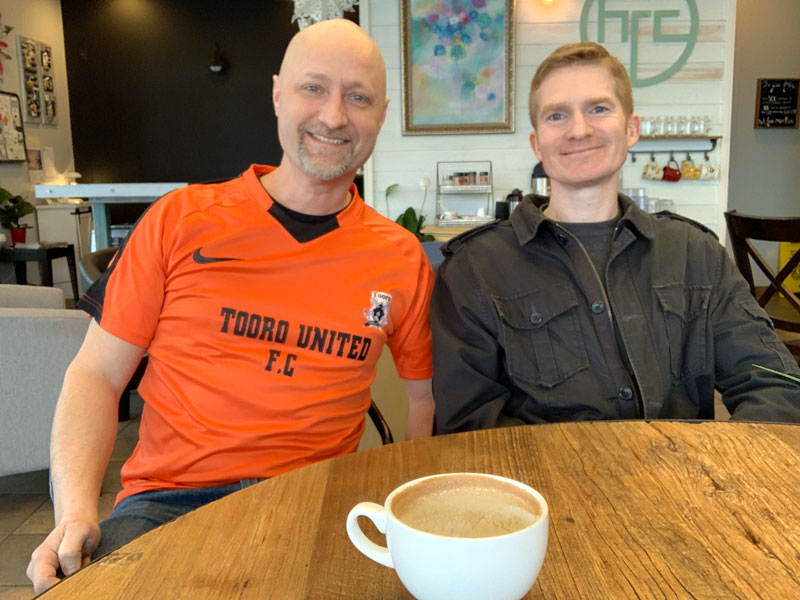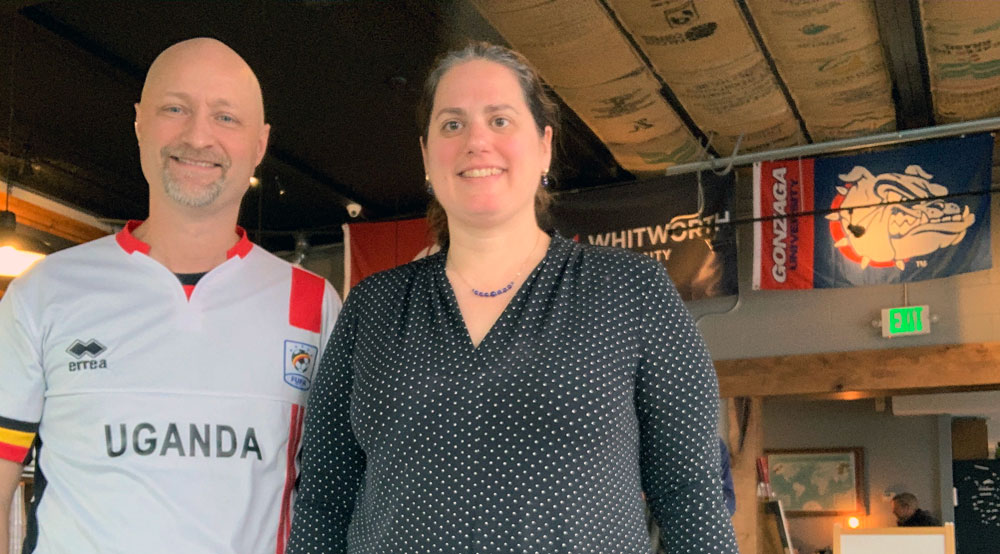Isaac Hebden is a runner, but I’m his friend anyway.
The other day he told me this terrible story about a time he ran 12 miles in an unfamiliar neighborhood and decided it wasn’t far enough, so he swerved off his planned route with the intention of cutting back over to the area where his final destination waited.
When his new path didn’t allow for a cutback route, he just kept plodding away in the wrong direction, mile after mile. And you know what he finally did when he got tired enough? He stopped and called his wife to come bail him out.

Dr. Isaac Hebden at The Garden Coffee & Local Eats
I don’t know what it would be like to ever run that far, but I have a lot of experience traveling stubbornly in the wrong direction and hoping no one would notice I’m looking more and more ragged with each passing landmark.
Out of gas.
Out of water.
About to collapse.
Looking for any option other than admitting my need to be rescued …
• • •
Isaac Hebden is a pastor, and he’s a friend to people like me anyway.
Actually, he’s got a soft spot for the choose-your-own-adventure type. He’s traveled those roads himself.
Isaac likes a story told by Jesus about a young man who passionately pursued everything he wanted from life and ended up broke and desperate. And then Jesus delivers this epic line about what ended up being the turning point for this guy: “When he finally came to his senses.”
This guy is best known as the Prodigal Son (not to be confused with the crime drama Mondays on FOX), and I can relate to him. A few years back I was doing the whole have-and-eat cakewalk. I worked crazy hours trying to tame a beast of a business that was actually slaying me. Along the way, I kept believing I could be a first-rate husband, father and friend without changing a thing about my life. What I was really doing was running scared in the wrong direction, lying to myself that my lucky break was just around the bend.
Can you relate? Ever come up with a recipe for Awesome Sauce that ended up tasting like Awful Sauce — and served it anyway? Ever realized you’re at the end of your rope — and kept reaching anyway? Ever been exposed and made up a face-saving narrative — what’s the point of vulnerability, anyway?
Isaac was one of the people who helped me with that whole “finally come to my senses” thing. It was good to have friends nearby, because let’s be honest: This is brutal.
“There is a moment where you have an awakening where you realize, ‘I’m not the person I thought I was, and I can either do something about it or put my head down and keep running,’” Isaac said. “How many people put their head down and keep running because it’s painful to look around and say, ‘Have I been on the wrong road all along?’ Who wants to do that?”
If you find yourself at such a crossroads, may the good Lord give you a friend like Isaac, someone who has been there, done that, and lived to write 48,000 words about it.
• • •
Isaac Hebden is a doctor, but for now he has agreed to be my friend anyway.
All those words were for a dissertation he wrote last year en route to achieving his doctoral status. The dissertation examined the prominence of pastoral burnout and strategies toward a more holistic, emotionally healthy approach.
For Isaac, it was a timely project, seeing as how the longtime associate pastor at his Spokane Valley church, The Intersection, was recently named the new lead pastor.
That’s not to say the conclusions he reached are only for pastors. After all, the symptoms he was describing — emotional fatigue, disillusionment, exhaustion, self-deception — cross vocational lines. Isaac said the solutions, while drawn from the life and teachings of Jesus of Nazareth, work both inside and outside the church.
“We just believe that the principles Jesus lives by and teaches will make your life better, so if you don’t even believe in Jesus, try the principles and see if it works,” he said.
• • •
Isaac Hebden is a human being, and that’s more important than his resume.
Yes, he can run for days, pastors a church and has earned a doctorate, but his research — and his experience — has taught him that Jesus didn’t accomplish all kinds of things in order to form his identity, but the other way around.
“Jesus was clear on his purpose and his identity, and out of that he was able to do things of significance, and from there it was fruitful,” Isaac said. “We try to make fruit and then become significant. … We do things in order to be accepted, and so it’s backwards.”
So how do we find peace in our own skin without having to put on another exhausting show for acceptance? Isaac encourages people to go on a journey of building self-awareness and implementing practices of “being.”
Whether you follow Jesus or not, tools like the Enneagram can help you better understand your makeup and lead you on a pathway to more holistic health, Isaac suggested, adding that self-awareness is aided by community and humility.
Isaac recommends surrounding yourself with people who will tell you the truth in love, and then actually listening to them instead of playing the role of defense attorney.
“There is a required amount of humility that one has to have (for) self-awareness,” he said. “Those people who do not ask for help and don’t want to be in community, who aren’t willing to listen, they will end up in trouble.”
After vulnerability paves the road for greater self-awareness, Jesus modeled a set of practices that are more about personal growth than showy accomplishments. Examples include celebration, community and quiet solitude, among others. He said that last one is particularly rare in our plugged-in, distraction-rich culture. Contrary to popular opinion, you don’t have to be a monk to practice solitude. Isaac said even successful CEOs are known to start their day in stillness and quiet.
“Silence reminds me that I’m not in control, that there are other things beyond me,” he said. “What is devalued unintentionally (by our culture) is the idea of being. … So to just sit and not do anything is so counterintuitive to what we think is beneficial, but perhaps it’s the most beneficial 15 minutes of the day.”
Whether it’s embracing the quiet, a heartfelt visit with a friend or pausing to celebrate, the theme of many Jesus practices is simply slowing down. Isaac said this helps people feel more integrated, more whole, more healthy.
“The best that I can bring into any situation is the healthiest me, which requires some self-reflection,” he said.
One good thing about “finally coming to your senses”? The “doing” path is shown for what it really is — exhausting, unhealthy and ultimately unfulfilling.
“Everybody has some specific identity; every person has intrinsic value,” he said. “The difficulty for each person is to get off the treadmill, look around and see who you really are.”
Connect with Isaac Hebden at The Intersection Church, 905 N. McDonald Road in Spokane Valley or reach him at ihebden@theintersection.info.
Coffee Notes
Isaac and I met for this conversation at The Garden Café & Local Eats in Spokane Valley. Isaac’s go-to order is an Americano. Before I realized Isaac had secretly arranged to put my order on his tab, I went for an oat milk latte and — why not? — a bowl of chicken tortilla soup. Man, it was delicious. Thanks, bro!

Thanks for the coffee, the soup and for letting me read your dissertation, glimpses of which I recognized from the many times you have spoken into my life over 25-plus years of friendship. I’m blessed.
— Josh Johnson (soccer jersey: Tooro United F.C. of the Uganda Premier League)
While you’re here, would you do me a favor?
If you enjoy articles like this one, join the CoffeeJosh mailing list. It’s hurry-free, spam-free and also free … free. As a thanks, I’ll send you a PDF — you guessed it, free — that has 10 of the best coffee shop orders in the Spokane area. (All 10 are drinks and treats local coffee shop owners make for themselves. In this case, expect to pay for your order and feel like it was totally worth it.)






